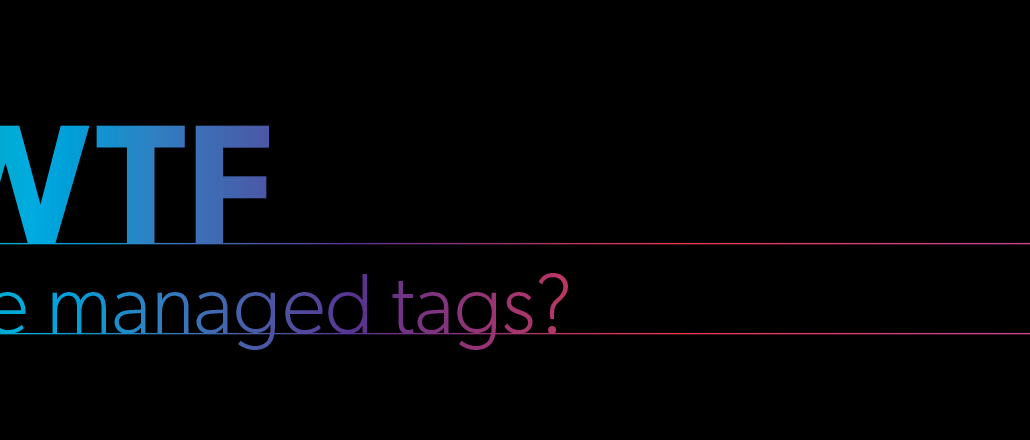Secure your place at the Digiday Publishing Summit in Vail, March 23-25

This article is a WTF explainer, in which we break down media and marketing’s most confusing terms. More from the series →
As the rise of header bidding has shown, publishers are cool with plugging buyers directly into their sites if it means fetching more cash for their inventory. Enter the “managed tag,” a still-obscure way for publishers to make that happen, albeit within the ad server.
Here’s a primer on managed tags, why agencies are pushing for them and why some publishers don’t want to go anywhere near them.
First things first: what’s a tag?
That’s a good place to start. A tag is a chunk of code placed within the header of a page to perform a certain task, such as analytics or retargeting.
Simple enough. What about a managed tag?
For buyers, a managed tag is basically one way to get an early look at publishers’ inventory at a fixed cost. By plugging a tag into a publisher’s ad server, a buyer is able to see and possibly bid on inventory before the ad call, after which that inventory is offered to other potential buyers, both direct and indirect. It’s basically calling dibs.
Why would buyers want this?
Managed tag deals are done at fixed CPMs. That’s good for buyers for two reasons: One, it helps them avoid auctions, which tend to push prices upwards (which is great for publishers but not buyers). And, two, it tells them exactly how much a publisher deal is going to cost them. And it doesn’t hurt that managed tags also help buyers slim down the number of ad tech partners they work with, which means lower transaction costs per impressions. All of that helps them plan and manage costs.
So this isn’t just tag management?
“Tag management” and “managed tags” share words, but this is ad tech, so it’s not that simple. Tag management has been around for a while. It’s just a way for marketers to, ahem, manage their tags. Not at all the same thing.
This sounds like a buyer cherry picking the best, leaving the rest. What do publishers get out of this?
Theoretically, they should get more money. Managed tags are another way for publishers to switch up the order in which they offer inventory to demand sources. Buyers are willing to pay more cash for more direct, prioritized access to certain inventory, which means higher CPMs for publishers. It also means that publishers are more likely to get bigger programmatic commitments.
Can only one buyer have a managed tag in a server?
Yeah, and that’s exactly the problem. Managed tags haven’t caught on in a big way yet, but if they do, then publishers are likely to be getting plenty of requests from buyers looking for their own spots within publishers ad servers. One side effect: slower page performance, thanks to all the extra work the ad server is forced to do.
This sounds a bit like the header bidding thing that everyone is talking about.
Header bidding and managed tags are similar. With header bidding, publishers give more demand sources header-level access to their inventory at the same time, which means more competition and higher CPMs. With managed tags, buyers get more control and visibility into publishers’ inventory by plugging into the ad server, which is great from their end.
Are publishers jumping all over this?
Not yet. As it turns out, giving buyer ad server-level access to inventory gives publishers plenty of pause. “When I talk to publishers about doing this, I get stop signs everywhere,” said Brian Nadres, director of programmatic media at The Media Kitchen. “Publishers aren’t sure they can truly trust an advertiser enough that they’re willing to make changes to their infrastructure.”
And yet we’re still talking about this…
Publishers aren’t going nuts over this yet, but it’s very possible that the big agencies could force their hand down the line. “Right now, there are more negatives than positives, but that could change,” said one publisher exec.
More in Media

How creator talent agencies are evolving into multi-platform operators
The legacy agency model is being re-built from the ground up to better serve the maturing creator economy – here’s what that looks like.

Why more brands are rethinking influencer marketing with gamified micro-creator programs
Brands like Urban Outfitters and American Eagle are embracing a new, micro-creator-focused approach to influencer marketing. Why now?

WTF is pay per ‘demonstrated’ value in AI content licensing?
Publishers and tech companies are developing a “pay by demonstrated value” model in AI content licensing that ties compensation to usage.





